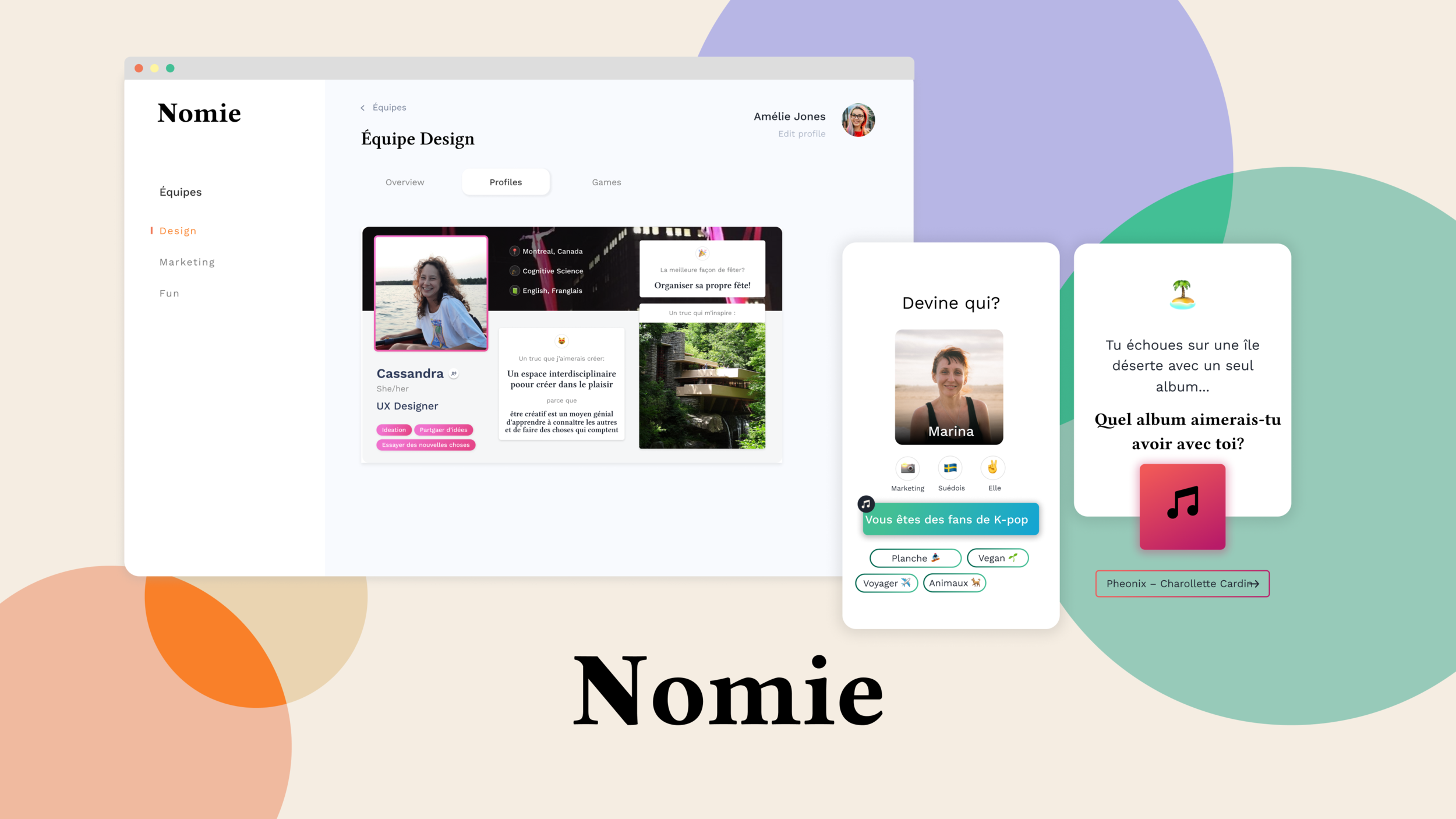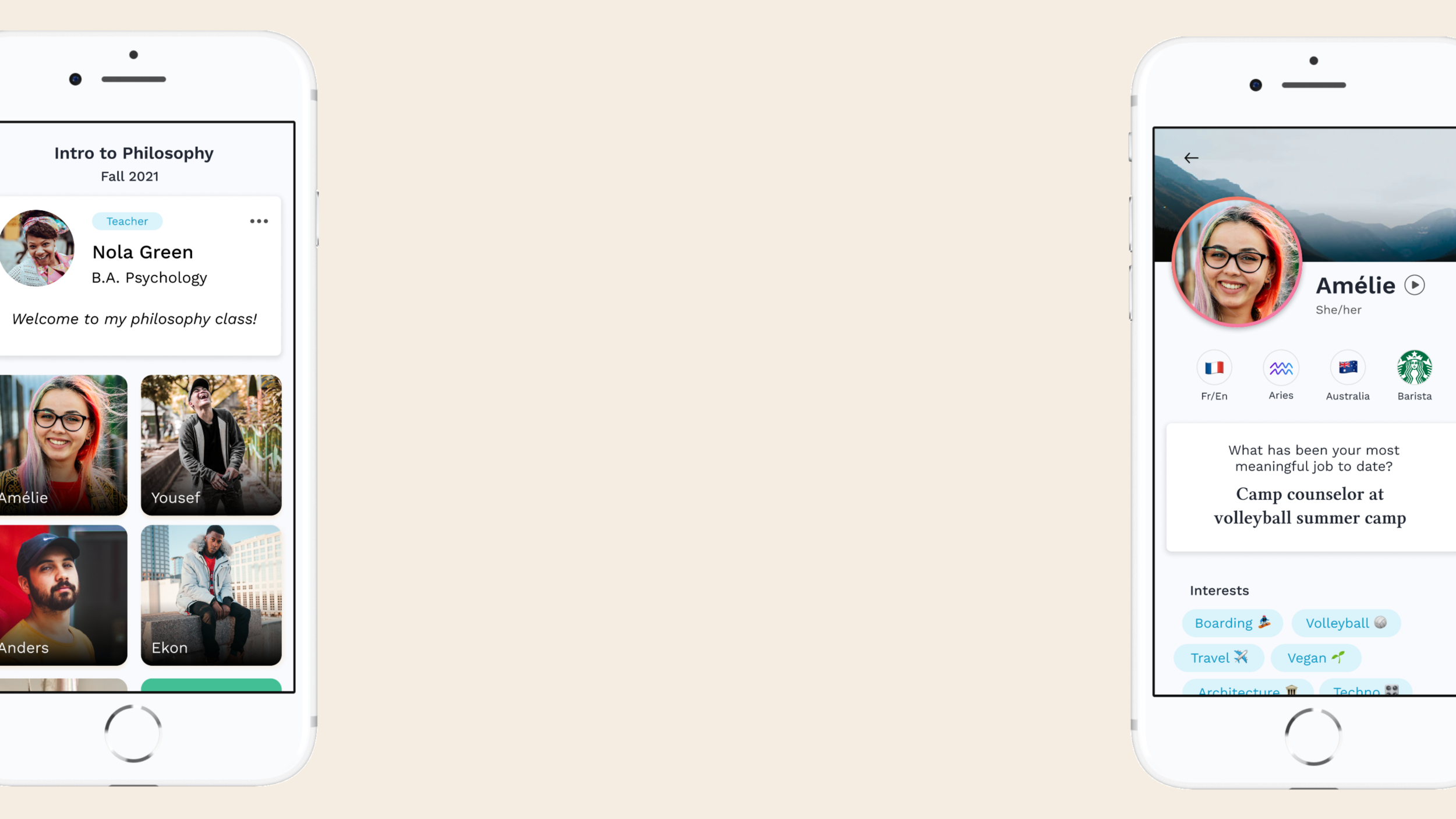
A digital space for building communities grounded in interpersonal trust.
Role: Co-founder, product research and development
Team: Sonia Hudon (co-founder and teacher), Nicholas Lee (developer)
Time: October 2020 – current
Overview
In the age of social media and remote work, people have been finding it harder than ever to come together in meaningful ways. The communication tools at our disposal are failing to facilitate the all-important interpersonal relationships which make networks of people flourish. Without bonds rooted in trust and compassion, we’ve collectively been engaging in difficult conversations around inclusion, diversity, and purpose without the groundwork necessary to have those conversations.
I co-founded Nomie to offer an intentional way for groups to lay this groundwork. Our solution leverages digital tools to contextualize communication networks within the interpersonal context. In our experimentation, we strive to make a difference by designing tools and technology which foster play, introspection, and trust.
In November 2020, Nomie won 1st place in the Coopérathon open call for ideas, securing the project a $10,000 grant from the Ministère de l'Éducation in Québec. Over the course of 2021, we have launched live pilot studies with over 200 users and are iterating on an MVP of a web-tool plug-in.
In September 2021 we were invited to join the social innovation incubator District 3. This collaboration has inspired us to use more co-design and collaborative methods in our research and design process.
We are now seeking collaboration and funding from local communities in Montreal. Our hope is to keep building and learning in a co-design method so that one day we may officially launch our refined product to workplaces interested in making important cultural changes.
To learn more about our journey, visit nomie.ca.
The Problem
As two people who are deeply passionate about getting people to connect, my co-founder and I were both concerned by the social disconnection felt because of remote work.
Without face-to-face social interactions binding us to our jobs and communities, many find it challenging to find purpose in what we do. So much so, that 42% of employees have considered or have already left their current employee to find a stronger sense of purpose elsewhere.
After speaking with several caring managers and teachers, it’s clear the problem is not that employers don’t care about the well-being of their employees. Many community leaders who seek change, don’t have the tools necessary to empower their remote and hybrid teams. Furthermore, companies who actually seek culture change through consulting organizations don’t have the foundation necessary for leaders within their organization to enact the kind of inclusive and value-driven culture they are seeking.

Our Solution
Nomie is a web tool-set designed to help people in schools and organizations feel they are part of a living breathing community grounded in a collective purpose.
Throughout the many stages of the employee lifecycle, Nomie engages remote and in-person workers with interactive experiences to share their passions and connect with a collective goal. By facilitating connections built on WHY we work, Nomie creates a comfortable space to go beyond day-to-day tasks and feel motivated by each other's real passions
Nomie will integrate seamlessly with existing communication platforms already embedded in organizations, to make it even easier to participate and work our tools into the day-to-day functions of an organization
Unlike social media or internal communication platforms built for workplaces, Nomie has been co-designed with communities and experts in play and inclusion to discover what makes everyone in a group want to participate. Our tools are not addicting, time-consuming, or boring, instead they “humanize” everyday moments to bridge the gap left from classic team building activities like getting drinks with your co-workers.
Even with the many tools at employees’ or students’ disposal, none of them fill the gap left by remote work/learning and foster specifically the interpersonal connections needed to feel purpose. Many focus on sending feedback, but none successfully create more actually inclusive cultures or foster connections because strong interpersonal relationships are the foundation for these kinds of conversations.
Research and prototyping
Encouraging natural formation of relationships is a tenuous task; so the development of Nomie is grounded in tight collaboration with teachers and students. In a series of user interviews and focus groups, we worked with Cégep students and teachers to firmly establish problems and pain points with meeting others. Using these insights I constructed our first light prototype and have began eliciting more feedback for further iteration.
Research and design schedule
Lessons Learned
Context-sensitive focus
Our original ice-breaker games attempted to encourage conversation around personal information, for example, your influences, hobbies, and interests. During a co-design phase, we found that many students were happy to know personal information about eachother, but placed a great emphasis on interpersonal information that was most relevant to the education context. In our next design, we tried to bring a strong focus to conversation about common ground – in the case of students, the school work.
Experiences that feel more conversational
In one feature, we asked users to tell the others in their group information about themseleves. Our original design had layed out the information in a list format, similar to a survey. We found that many students skipped over questions easily and tended not to answer very many.
In our next iteration, we asked less questions (only 3 to be exact), but asked them in such a way that felt more manageable by placing them on separate screens. We found students were more likely to answer questions using this format.
Next Steps.
In order to secure more funding and support from key stakeholders in the education system, we are iterating furiously to solve users problems using light prototypes. Three Cégep classrooms have already signed on to become our first pilot test groups for the winter semester of 2021. Over the course of the term, we will collect longitudinal data on how relationships between teachers and students are impacted after using the Nomie application.








